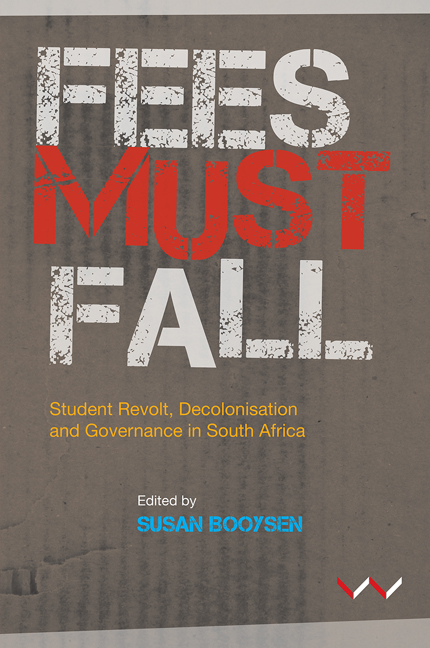Book contents
- Frontmatter
- Contents
- Acknowledgements
- Preface
- Introduction
- PART ONE POWER REDEFINED – ‘WHAT HAPPENED TO GOVERNANCE?’
- PART TWO PRIMARY VOICES – ‘THE ROOTS OF THE REVOLUTION’
- PART THREE THE REVOLT – ‘RISING AGAINST THE LIBERATORS’, SOUTH AFRICA IN AFRICA
- PART FOUR POWER AND CLASS REDEFINED – ‘SIT DOWN AND LISTEN TO US’
- Chapter 9 To win free education, fossilised neoliberalism must fall
- Chapter 10 Bringing class back in: Against outsourcing during #FeesMustFall at Wits
- Chapter 11 Between a rock and a hard place: University management and the #FeesMustFall campaign
- Chapter 12 Financing of universities: Promoting equity or reinforcing inequality
- PART FIVE JUSTICE, IDENTITY, FORCE AND RIGHTS – ‘WE CAME FOR THE REFUND’
- APPENDICES
- Contributors
- Index
Chapter 11 - Between a rock and a hard place: University management and the #FeesMustFall campaign
from PART FOUR - POWER AND CLASS REDEFINED – ‘SIT DOWN AND LISTEN TO US’
Published online by Cambridge University Press: 20 April 2018
- Frontmatter
- Contents
- Acknowledgements
- Preface
- Introduction
- PART ONE POWER REDEFINED – ‘WHAT HAPPENED TO GOVERNANCE?’
- PART TWO PRIMARY VOICES – ‘THE ROOTS OF THE REVOLUTION’
- PART THREE THE REVOLT – ‘RISING AGAINST THE LIBERATORS’, SOUTH AFRICA IN AFRICA
- PART FOUR POWER AND CLASS REDEFINED – ‘SIT DOWN AND LISTEN TO US’
- Chapter 9 To win free education, fossilised neoliberalism must fall
- Chapter 10 Bringing class back in: Against outsourcing during #FeesMustFall at Wits
- Chapter 11 Between a rock and a hard place: University management and the #FeesMustFall campaign
- Chapter 12 Financing of universities: Promoting equity or reinforcing inequality
- PART FIVE JUSTICE, IDENTITY, FORCE AND RIGHTS – ‘WE CAME FOR THE REFUND’
- APPENDICES
- Contributors
- Index
Summary
INTRODUCTION
In these challenging times, what is needed is less anecdotal critique of managerialism and more research into how leaders can implement wellconsidered change.
– Geoff Sharrock, The Guardian Higher Education Blog, 26 September 2012Leadership and management in the contemporary university in South Africa are complex, and take place in a fluid and contested environment. The need and demand for accountable and effective leadership by university executives, in particular vice-chancellors, is becoming increasingly evident. This is manifested and exacerbated by the recent sectoral and institutional disruptions and protests by students, contracted workers and academic staff in the guise of, for example, the #RhodesMustFall, #FeesMustFall and #OpenStellenbosch campaigns. This chapter explores and engages the challenges and complexities of leadership and management at the University of the Witwatersrand (Wits) during the #FeesMustFall campaign. To this end, we identify and reflect on the challenges and issues related to this campaign, its implications for institutional leadership and management, and the lessons learned.
We aim to demonstrate that the conception and practice of accountable, effective leadership in the universities, without the requisite enabling drivers such as adequate funding, have serious consequences for the institutions, given their current context and complex environment. The main contention here is that sectoral and institutional initiatives will fail and not contribute to a sustainable, quality and responsive higher education system without the appropriate level of resources – in particular, funding and requisite governance, leadership and management. We point out that the prevailing crisis with funding and financing of higher education has constrained and compromised university executives, and added another layer of complexity to their required leadership and management capacities.
Significantly, the apparent balancing factor of relatively stable external party political structures, as represented mainly by the African National Congress (ANC) leadership and Youth League structures, have seemingly collapsed. This skein of relationships and networks, which organically connected student politics to the broader considerations and interests of party and government, has all but disintegrated – opening up new possibilities of much more independent and radical perspectives and actions within the campus milieu.
Information
- Type
- Chapter
- Information
- Fees Must FallStudent revolt, decolonisation and governance in South Africa, pp. 235 - 255Publisher: Wits University PressPrint publication year: 2016
